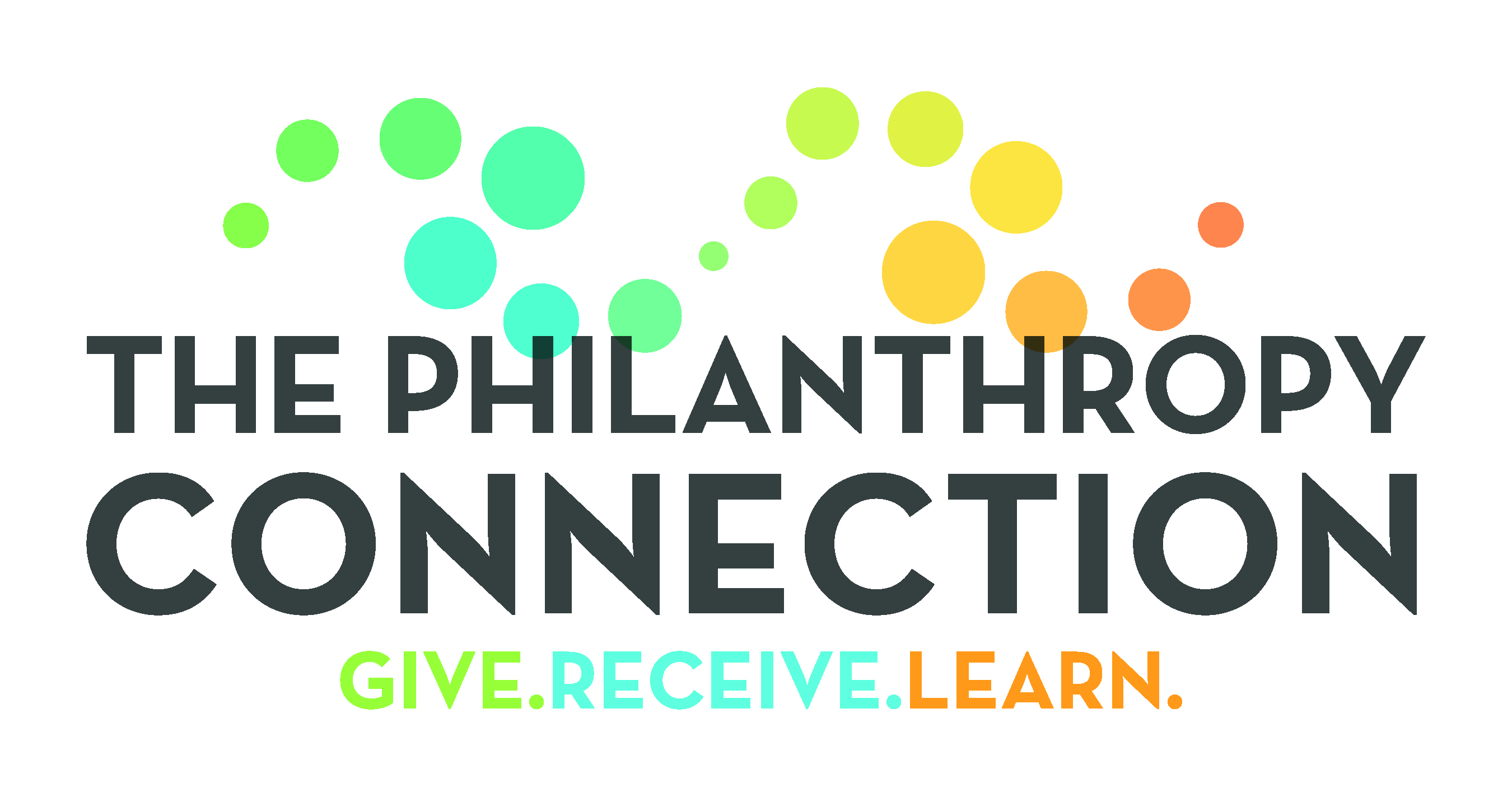The Interview with Nancy Frost
 Our TPC Liaisons spoke with Food Link’s volunteer extraordinaire Nancy Frost to talk about the work of this Arlington-based grantee. Food Link (FL) collects high-quality fresh fruit, vegetables, meat, dairy, bread, and prepared foods that would otherwise be wasted from 24 local grocery and prepared food stores. FL delivers this nutritious food to over 42 social service agencies serving people in need, including after school programs, programs for at-risk youth, low income housing facilities, homeless shelters, food pantries, and senior centers.
Our TPC Liaisons spoke with Food Link’s volunteer extraordinaire Nancy Frost to talk about the work of this Arlington-based grantee. Food Link (FL) collects high-quality fresh fruit, vegetables, meat, dairy, bread, and prepared foods that would otherwise be wasted from 24 local grocery and prepared food stores. FL delivers this nutritious food to over 42 social service agencies serving people in need, including after school programs, programs for at-risk youth, low income housing facilities, homeless shelters, food pantries, and senior centers.
Tell us a little about yourself and how you came to work with FL.
I’m a retired non-profit administrator and was able to follow FL from its start in 2012. One of the founders is a close friend, and I watched with amusement, and then amazement, as she discovered multiple stores with unused surplus food destined to become waste until she began to rescue and redirect it to those in need. This work was done by the founders and a small group of volunteers who were delivering food out of their garages to multiple places in Arlington – youth programs, low-income housing, the Senior Center – anywhere they found a need.
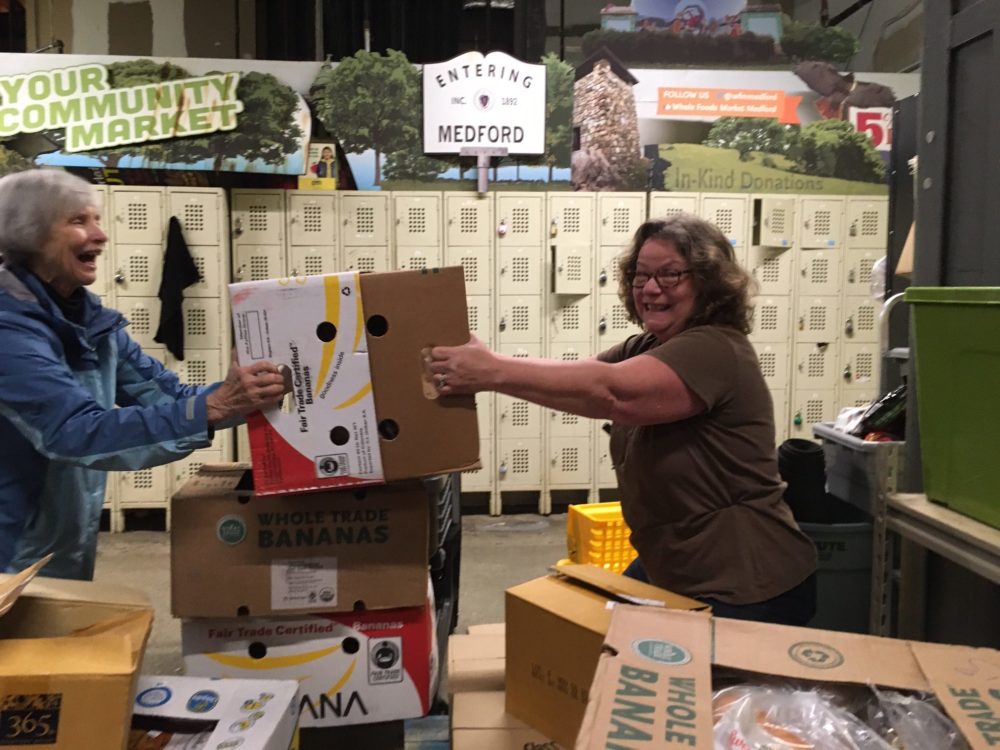 Why did you decide to get involved with the organization?
Why did you decide to get involved with the organization?
I was drawn to the dual mission of reducing food waste and all of the environmental costs it incurs, and supporting individuals in our communities who are food insecure. FL is a small organization that acts as a catalyst to promote big, important changes. As a former management consultant, I was impressed with the efficiency of the organization, which was run and staffed entirely by volunteers when I joined. The flexibility and creativity of the team made volunteering fun. We always seemed to be running into new challenges and opportunities, and there was a lot of room to try new approaches to improve our effectiveness.
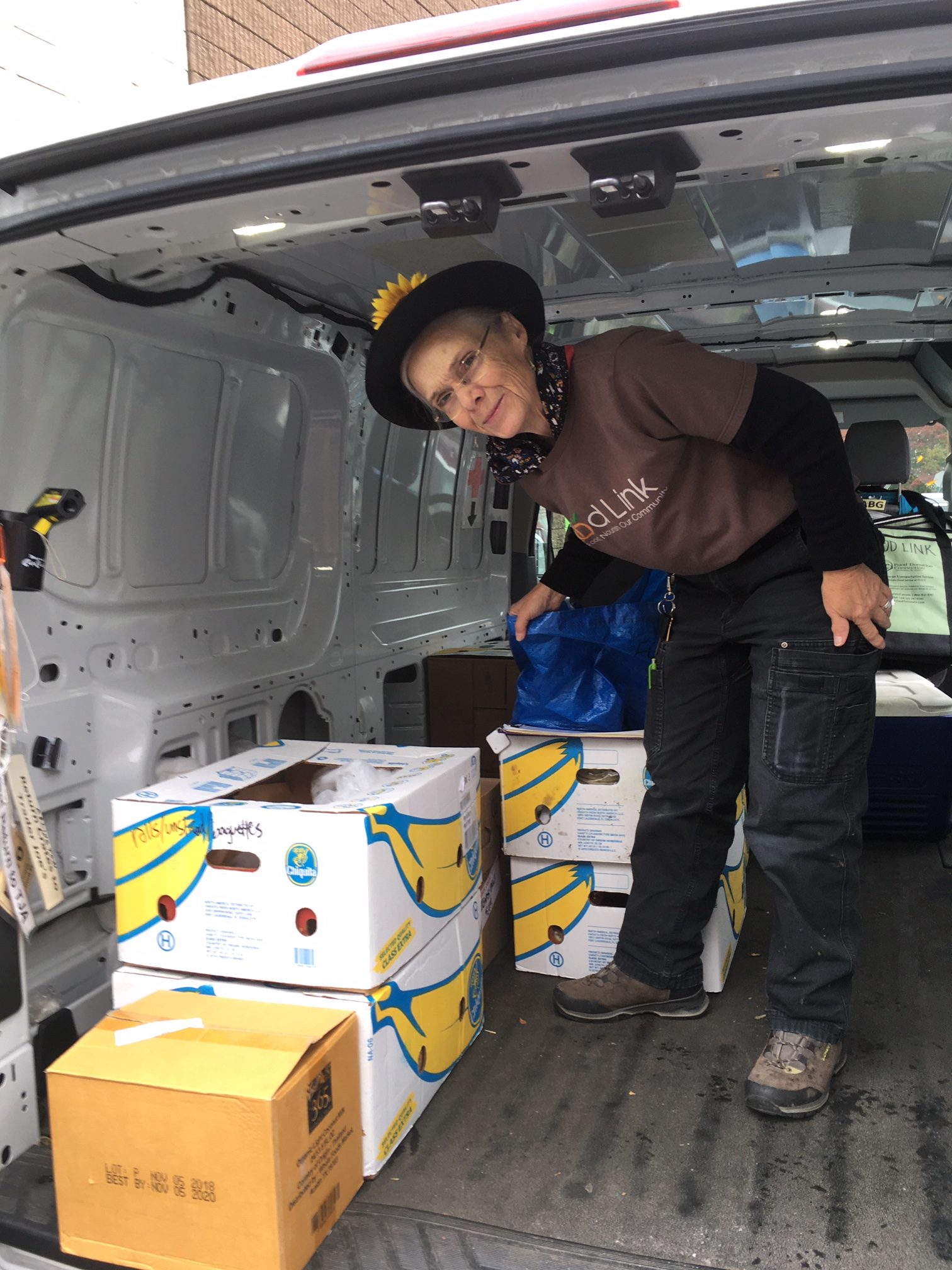 As a volunteer since FL’s earliest days, tell us how FL has grown over the years.
As a volunteer since FL’s earliest days, tell us how FL has grown over the years.
When I began volunteering, we had just moved from the founders’ garages into our first “hub,” a shared space with the Arlington Food Pantry. That move allowed us to accept some donated commercial refrigerators and freezers, thereby increasing the amount of food we could redirect into the community. We did all of the collections and distributions in our own cars – a messy proposition and one that limited the size of deliveries at times. The addition of a van funded by donations made a huge difference in what we could accomplish. We are now looking at having our own space and it’s massively exciting to think of all the ways we’ll be able to grow.
We’ve added many more collection sites as FL has gained more recognition, and we’re now delivering food to programs in locations from South Boston to Lawrence. We began with the idea of staying an Arlington-based program with the hope that we could develop the operational tools to help other communities form their own food rescue organizations. We’re still very much rooted in Arlington, but we expanded our reach once we became aware of the disconnect between communities with stores able to donate high-quality, nutritious food and the communities with the most food insecurity.
FL has grown so much that we’ve needed to add staff to join with our army of volunteers. It can be tricky sharing leadership between professional staff, founders, and long-term volunteers. I’ve seen other non-profits struggle, and even fail, as they grew to this stage. FL has continued to remain flexible and innovative in the ways in which it shares leadership, retaining that army of volunteers while the staff takes on new tasks to help the organization stay efficient as it grows.
What makes FL different from other food rescue organizations?
We are able to really focus on the needs of our recipients. Many food rescue organizations pick up boxes of food at a store and deliver those boxes straight to a shelter or food bank. Because the food may include spoiled or unsuitable items, the recipient agencies may throw a large amount away, resulting in unmet food needs for their recipients.
We sort the food we receive for quality, composting anything that is unsafe or spoiled. We also take the time to know our recipients and send them food that is culturally and age appropriate. We love being able to direct spicy peppers to our Dominican communities, Caribbean vegetables to a Haitian congregation, and baby formula to a shelter with young families. We want recipients to know that we see them.
FL is fortunate to have been started by two founders who have different yet complementary skill sets, and who share a common passion to reduce food waste and feed hungry neighbors. It’s my observation that many young non-profits have either leadership with good organizational and accounting skills, or passionate determination to help people in need. FL has had both from the beginning, and that’s been a real strength.
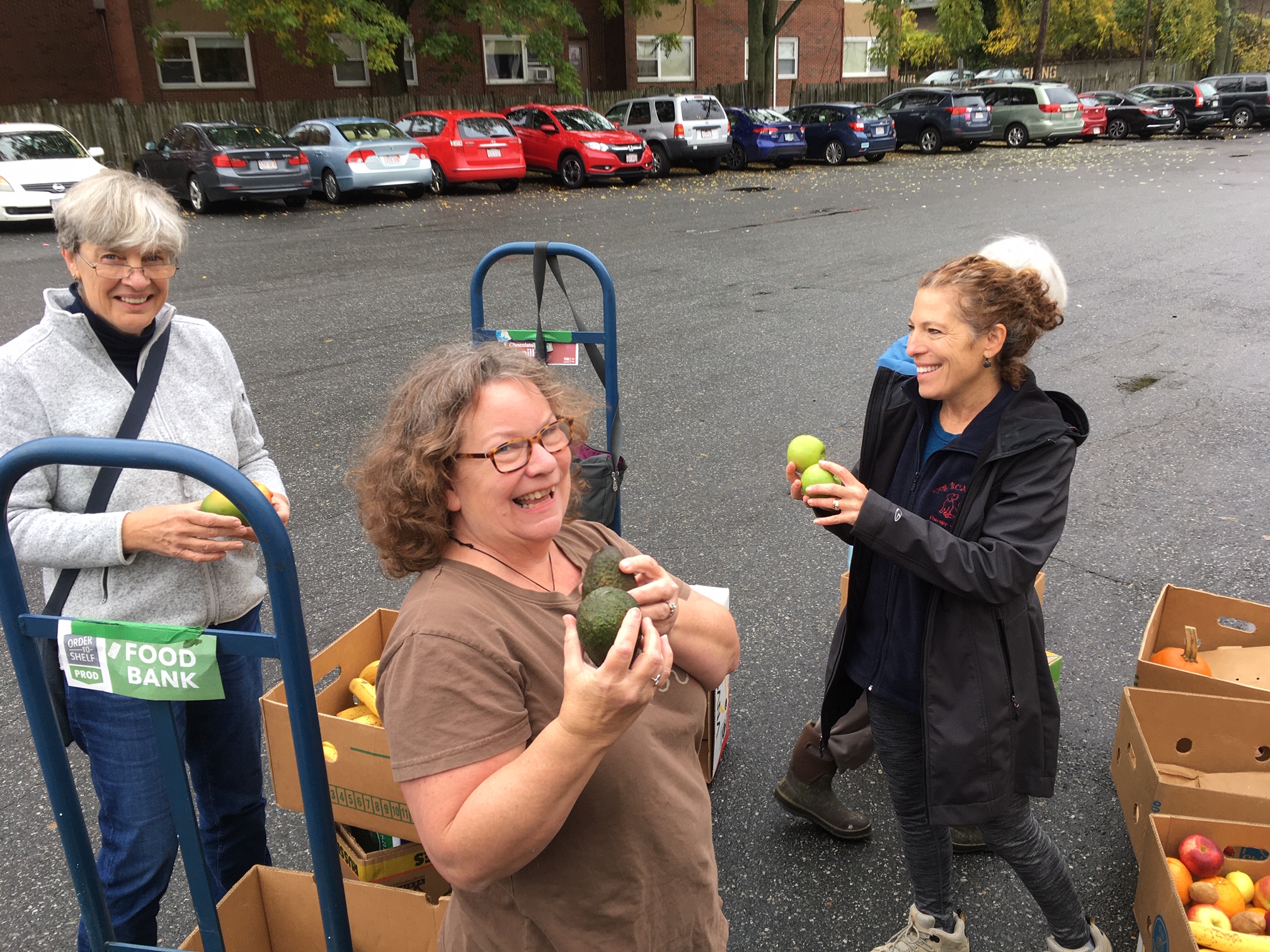 Tell us about the volunteer experience with FL. What do you love about it, and what are the volunteers like?
Tell us about the volunteer experience with FL. What do you love about it, and what are the volunteers like?
We laugh a lot. This is important, especially when you’re sorting wet vegetables in a store parking lot at 7 a.m. in a snowstorm. I always say that people come to us for the mission and stay because of the volunteers. Our volunteer teams are quite diverse. We have high schoolers needing community service hours working alongside 80-year-olds. We have volunteers from all income levels and backgrounds working side-by-side – it’s hard to find that kind of diversity in a volunteer organization.
Our staff works hard to find a volunteer opportunity that is a good fit for each person who wants to help. People who can’t lift heavy boxes may wash towels and cleaning rags. Young kids can sort and unpackage canned goods back at our hub. People who work all day can do a 10 p.m. pickup at Panera Bread. Extroverts can staff a table at a farmers market or give an educational presentation. Introverts can quietly sort and pack bananas. We’re a team, and everyone fits a need.
What is most gratifying about your work? Is there an example that stands out to you?
The relationships with people at our recipient agencies give me a great deal of joy. We can’t end food insecurity with the boxes we distribute, but we can help individuals who are in a hard place and show them that they aren’t forgotten. Last week when I was finishing a late drop-off at a shelter for people trying to break the hold of addiction, one of the men who helped me carry food came back out to the van to say “thank you.” I smiled and told him we were glad we had things they needed. He said, “No, I mean thank you for remembering us. I was in a really dark place all day today, and you just turned it all around.” Wow! How often do you get a volunteer opportunity like that? It’s not just food we’re delivering.
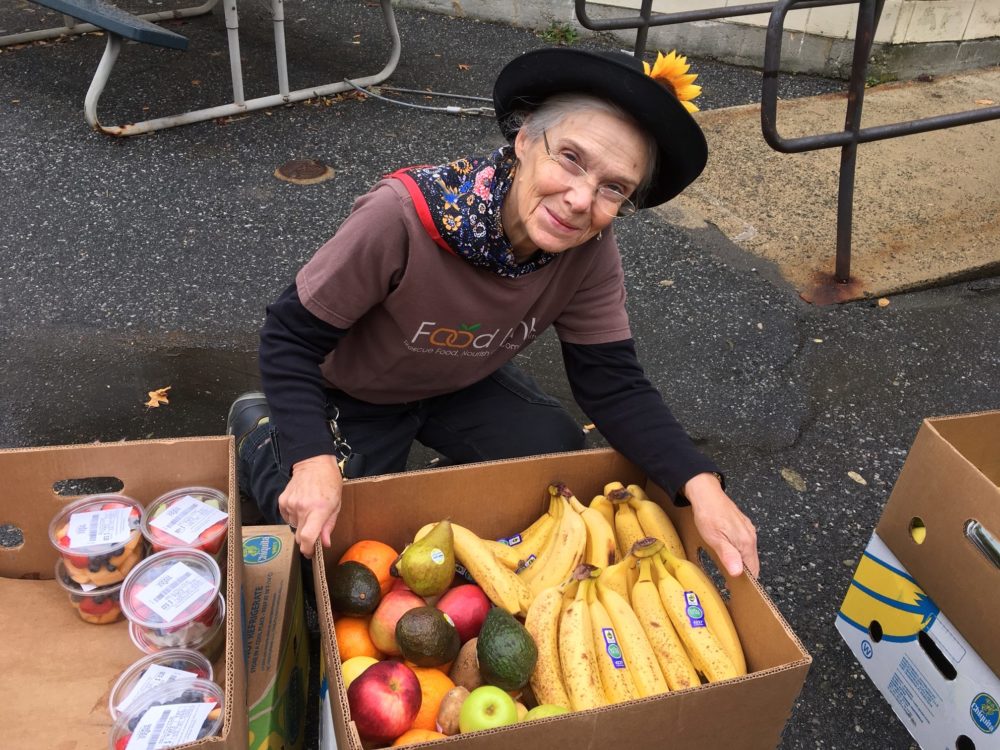 Another heartening experience was redirecting some food to homes impacted by the September 2018 Lawrence/Andover gas line emergency. I asked our regular recipients if they wouldn’t mind skipping a delivery so we could take their food to Lawrence. They didn’t. We took 90 banana boxes up, with some going to the emergency shelters and the rest to regular shelters whose donations were down as the community responded to the emergency. It was great to take food quickly to places that needed it badly.
Another heartening experience was redirecting some food to homes impacted by the September 2018 Lawrence/Andover gas line emergency. I asked our regular recipients if they wouldn’t mind skipping a delivery so we could take their food to Lawrence. They didn’t. We took 90 banana boxes up, with some going to the emergency shelters and the rest to regular shelters whose donations were down as the community responded to the emergency. It was great to take food quickly to places that needed it badly.
The best part of that experience was being thanked by our regular recipients for the chance to do something to help. The church that gave up food for 80-90 families wanted me to tell the folks in Lawrence that they were praying for them. And the next time I delivered to the senior housing site, several residents told me how glad they were that they could still do something to help others.
Tell us how you’re using TPC’s grant, and how members might be able to help in other ways.
With TPC’s grant, FL hired additional staff and interns, which has helped to increase the amount of food we have collected and distributed in 2019. TPC funds have allowed us to hire a full-time volunteer coordinator and a paid intern from Arlington’s Young Adult Vocational Program, which helps young adults with mental health challenges acquire job training and experience. We have also been able to do a comprehensive food safety training with FL’s 200+ volunteers who collect, sort, and distribute food each day.
FL is a young and growing organization. As we expand, we could use help in several areas including: staff leadership, board and governance, risk assessment, annual report creation, and trademark law. Finally, on an ongoing basis, we are always looking for food collection and distribution volunteers. You can visit our website to sign up!
